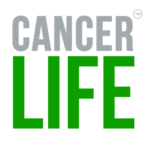The following is transcription of this video.
So we’ve changed our tagline for our company, um, from improving quality of life. I got to get a new poster too. The “More you Share the Better your Care”, That’s the new mantra around the cancer life community. And I’d like to explain what that means.
Well, it means that it’s so important for cancer patients to understand that the more they communicate what’s going on with them, the better the doctors able to respond and to address those issues specifically that are impacting your quality of life. Well, why isn’t it happening now? And I think that comes to a, just a disconnect between patients and doctors. It’s kind of like, don’t ask, don’t tell policy, um, you know, doctors don’t ask and patients don’t tell it’s like, uh, you know, patients have this expectation like, well, and at any moment that, you know, the doctor’s going to ask, you know, how am I doing or when they say, how are you doing?
You say you feel fine because you’re in that doctor’s office. And you’re thinking, I just want to know what the results of my scan, you know, that is in your hand, doc. I just want to know that I’m not thinking about all the other shit that I went through, you know, the last two weeks. And that’s a real problem. And doctors, you know, they ask, you know, how are you feeling? And you say fine, and then he, or she’s done and wants to get right to the results. So there’s really a disconnect moment.
That’s why the cancer life, you know, patient summary report is so powerful is that it’s a simple document that a doctor can look at and then three seconds determine here are the three things that I need to address your quality of life.
You know, I’m going to give you some scripts for, to handle this issue and you’re done. But if there’s never that engagement conversation going, uh, if it is it’s over too quickly and frankly, you know the question, how are you feeling? It’s just, it’s, it’s a numbing. It’s both a numbing feeling and no nothing numbing response.
The patients feel when someone asks them, because it’s called the symptom burden. There are 15 different things that, you know, where do I begin as kind of like, you know, how much time do you have doc? Cause I could talk about this all day long, but, and but, but patients don’t want to burden their doctor with this information. So that’s the one thing, the more you share a bit better, your care is the concept of, you know, there is a direct impact of your quality of life.
When you share this data. It happened in the groundbreaking study at Sloan Kettering, called the Ethan Basch, study of 2017. Patients were surveyed once a week, they filled out a 27 questions, survey burden questionnaire, and that data was presented to the doctor and the doctor addressed issues, 36% improvement in quality of life compared to folks who didn’t get that survey. So, and we at John Wayne, our initial phase two study showed a 25% improvement. So just by using the cancel life app two times a week, two times a week.
The more you share the better your care, there was a direct correlation for those who use the platform the most and their quality of life scores. So inside of cancel life, as we collected that. So that’s the concept around, the more you share the better your care, the final piece, which speaks to, if you look on our blog, um, you know, uh, Paul Zack, who is a world-famous, uh, neuroscientist, who discovered oxytocin, which is the love molecule, that thing that you feel when you hug somebody, um, talked about the important, you know, the value of when you share something. Someone understands you. There’s a neurochemical response of oxytocin released inside your brain.
It literally makes you feel better. So the more you share the better your care, meaning the better you’re going to feel. The more you share a better care as a foundation statement that speaks to the heart of the value of cancer life, the more you put into cancer life, the greater the return back to you. And is it true? We call data it a feedback loop, that the more you put into it, the more you get back that there’s a direct correlation in our data that shows the more you engage in the platform, the greater benefit you have to you directly. And that’s what CancerLife is all about.
As we are about to publish our phase two study and moving on to our randomized control trial phase three study, a randomized control trial to reach final clinical validation that should be achieved by the summer of next year. And like I said, the more you share the better your care.
Thank you very much.
